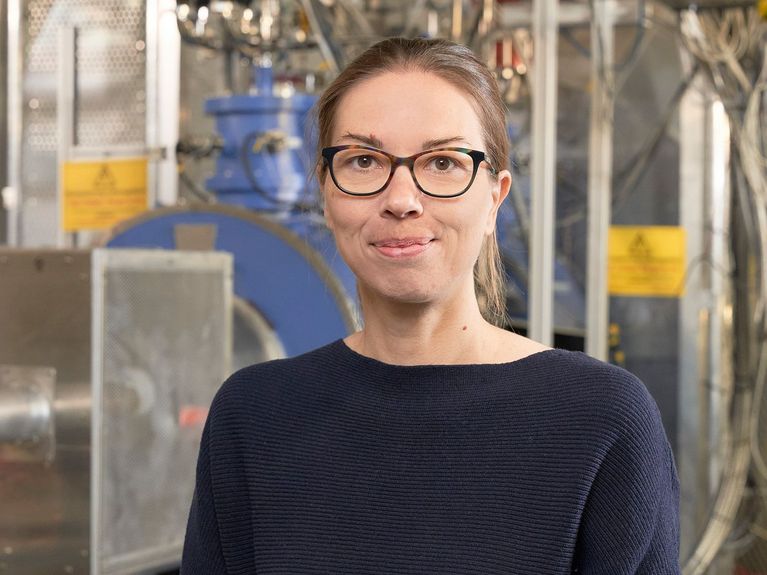Interview
“The continuation option of the program is something very special”

Kathrin Valerius is Professor of Astroparticle Physics at the Karlsruhe Institute of Technology.
In 2013, Kathrin Valerius was given her Helmholtz Young Investigator Group at the Karlsruhe Institute of Technology. She has remained loyal to the center and is now a professor of astroparticle physics there. She advises researchers in the postdoc phase to think about their own career aspirations at an early stage.
Ms. Valerius, could you tell us about the situation you found yourself in when you submitted your application for a Helmholtz Young Investigator Group in 2013?
Kathrin Valerius: After a change of subject in my first postdoc, I had to familiarize myself with a new field, but at the same time I was able to expand my personal network. After that, the question of my scientific orientation arose at the same time as my career decision: Do I want to go back to my initial research question? With the opportunity to lead a junior research group, I was then able to position myself clearly both professionally and in terms of my career decision. This step was my first major, independent research proposal, and I found the invitation from the Helmholtz Center to be incredibly positive. The support I received from the research funding and the host environment gave me a very good feeling for the future.
When did you realize that you were now really working “on your own account”?
Kathrin Valerius: Independence was particularly evident in the fact that you publish your own papers, which you have initiated yourself and advanced in your own research group. It was also something new to accompany the first doctoral student scientifically through to her doctorate and to take on responsibility for examinations. There were also responsible roles in the international collaboration in the KATRIN experiment. Leading your own team also gives you a completely different level of visibility in such a context. At the same time, I was not only able to make contacts with networks in the international community, but also to establish one myself. Together with a colleague from the University of Heidelberg, we initiated an exchange with a series of our own workshops and are still visible and effective today. Later, I received invitations to join national and international committees and bodies, including co-leading a topic in Helmholtz program research.
You had an independent junior research group, but at the same time you were (and still are) part of a collaboration around the large-scale neutrino experiment KATRIN. How did that work?
Kathrin Valerius: By taking on the junior research group I took something of a risk, as large-scale experiments can often involve unforeseeable delays. With the junior research group, however, you have an evaluation at a fixed point in time. In fact, the junior research group arrived at a time when it was already clear when we would get the first data from the experiment. I had also planned a few things that I could research or prepare independently of the start of the experiment, such as the analysis framework.
How have you been supported as a newly appointed junior research group leader and what helped you the most?
Kathrin Valerius: Just one month after starting the junior research group, I attended a course at the Helmholtz Leadership Academy that was tailored to my situation. That helped me a lot, especially in the initial phase, to assess where I stood and what I needed to do to get the team up and running. The KIT Young Investigator Network was a great support, and I also got involved as a speaker myself because I quickly realized how much this peer networking with people in the same situation, including those from other disciplines, gave me back.
What did you take away from your time in the junior research group?
Kathrin Valerius: This time had a strong impact on my self-perception as a researcher. I particularly remember the moment when one of my colleagues introduced himself as a member of my Young Investigator Group at a conference. I realized then that we had our own group identity to which we all felt we belonged. When I was on a business trip in the USA, I received a photo of my team celebrating our anniversary with balloons in my office as the group had been in existence for exactly one year at the time. I’m extremely proud of moments like that. I have also learned that my personal efforts to create a positive, productive working environment were greatly appreciated by everyone around me.
What advice do you have for postdocs today?
Kathrin Valerius: It is crucial to think carefully about your own career aspirations at an early stage. This is also something I actively demand from my own employees. Fortunately, there is now more support for postdocs, for example, through further training, advice, but also employment contracts with an appropriate duration. I am pleased that the Helmholtz Association is making a contribution through the option of permanent employment for junior research groups, which I find very special and important in the German funding landscape. This option has also enabled me to act in a completely different way in the junior research group. I didn’t apply externally for quite a while and put all my energy into leading the group. From my point of view, the program can continue like this for at least 20 years.
Readers comments